GrattaV (scratch and win) The Millionaire V.1.5
A downloadable The Millionaire for Windows
GrattaV (scratch and win) - RELEASE 7.0 - VERSION 1.5
Here is the famous "scratch card" called "The Millionaire" in a video game version!
Even without money you can have fun scratching the numbers of winnings in a video game that imitates a well-known Italian state contest!
The game works like this: there are 2 areas where numbers (and symbols) can appear; in the first one, called "winning numbers", there are the "winning" numbers. In the second one, called "your numbers" there are the numbers drawn. If one or more winning numbers appear in the drawn numbers, you win the corresponding sum of money. If a star appears in the drawn numbers area, you win 100 euros, if you see a horseshoe you win 200 euros, if you see a coin you win 500 euros, if you see an ingot you win all the prizes. Winnings can be 5, 10, 15, 20, 50, 100, 200, 500, 1'000, 10'000, 100'000, 300'000 or 500'000 Euro (in the demo version the maximum is 50 Euro). Each winnings are awarded to a ticket, but it can be divided in more than one winning number for an equivalent amount of money. Every second is bought a ticket (PURCHASE SIMULATION: Yes), so those that can be purchased vary depending on the time. Cards are created in blocks of 108,000,000 tickets (see picture 3). When a block is exhausted, a new one will be produced and distributed (this happens every three and a half years, approximately). Once the money is gone, you will lose the game. If you will earn more money than you had at the beginning, you will win the game and, if you have made a lot of Euros, your score will be added to the billboard of the 7 best players (see picture 6). You can buy 1 to 7 tickets at a time (see picture 4). When you realize you have won a sum, at the same time, even the computer will do it and report the score obtained with a message and a music.
"Scratch and Win" are a series of monopoly gambling games of the Italian State, one of the best known of which is called "Il Miliardario"; strangely, although they offer little chance of winning, in Italy they "sell like hot cakes" and many people spend a lot of money simply in the attempt to make a big win that rewards them for all the money lost. According to my point of view it is a fun pastime, but it is easy for it to become a sort of dangerous "vice" harmful to one's own economic assets. So I have collected in detail all the parameters that characterize "The Millionaire" simulating neither more nor less what the Italian State does, inventing a statistically correct algorithm (and with the same winning frequencies of the original game) that produces a stock of 108 ' 000'000 tickets and allows them to be distributed to virtual resellers (without Internet access). In Italy the frequency of sale of 1 ticket I have calculated is about 1 per second. So every second that passes one of the virtual resellers of my program excludes a ticket from the available ticket stock. When the user buys from 1 to 7 cards, they will be consecutive ones starting from those immediately available. All this allows the user to have fun without wasting money and learning to play in moderation, adjusting according to the experience he has had with this simulator, if he really wanted to play. In fact, 3 displays indicate the amount of your money in Euros (initially 100), the money spent in the bets (including those you have won) and the money won (but not necessarily more available). The money won increases the amount of your money, while the cost of the tickets is deducted. The only way to win is to stop a game when the amount of your money exceeds the initial amount of your money (100 Euros). If you interrupt a game in other cases, and quit the game, it will be automatically saved and you can resume it at another time by clicking on the "continue game" button.
If you run out of money and have scratched all tickets purchased, you have lost the game.
Since there are several versions of this game, I decided to develop my program, introducing some variations:
- Ability of Italian/English language support.
- Possibility to choose between four graphic resolutions (960x600 Pixel, 1024x768 Pixel, 1280x800 Pixel or desktop resolution).
- 2 game modes: one that simulates the purchase by other virtual players (as time passes, the total number of playable tickets decreases) and another that requires the user to be the only buyer (tickets will be drawn sequentially). NOTE: Not available in the free demo.
- Optional display of hints: at the bottom left of each ticket, the first red number indicates whether the ticket is a winner and what the payout is (0 → Not winning ticket; 1 → you have won 5 euros, 2 → you have won 10 euros, etc.), while the second red number is the progressive number of the ticket, from 1 to 108'000'000. NOTE: Not available in the free demo.
- Possibility to resume the previously interrupted game or to make a new one.
- Instruction manual in Italian and English in .PDF format included in the paid package.
- All of this is in addition to eye-catching graphics and to "MIDI" type instrumental music.
System requirements
This app run on all machines with operating systems from Windows XP to Windows 11 . As far as hardware is concerned, all AMD and Intel microprocessors that support 32-bit protected mode, which have a clock frequency of no less than 667 MHZ and which have at least 1 GB of RAM installed are supported.
GrattaV free demo file avalaible here
The free demo file of this video game is available here, in addition to the paid version; the demo file has 2 limitations: maximum win of 50 euros (this does not affect the frequency of wins) and reduced menu of game options.
Description of operation and warranty:
My programs are distributed in 2 versions: zip archive generated with WinRAR (*) and installer created with Inno Setup Compiler (**); they do not contain advertising, there are no pop-ups of any kind, you do not have to pay to win, they do not connect in any way to the internet, they do not install or modify any DLL (dynamic linked libraries), all the files used by my applications are were created solely by me (***) and are transferred to a single destination folder. My program never accesses files outside the folder to which it was transferred, with the exception, only for some programs, of a configuration subfolder of the root directory of your hard disk/SD, created specifically to contain temporary files and preferences.
The installation program will only take care of selecting the destination, transferring files, creating an icon in the programs section of the start menu, optionally creating an icon on the desktop and configuring the new file extensions, defined by me, in such way that, doing a double click on one of them, he is load it into memory, to be able to modify it.
In Windows 10 or Windows 11 it is not recommended to install this software in the "Program files" and "Program files (x86)" folders, because, if you do not run this software, after the installation process, with administrator privilege, is impossible to save the configuration file, the top players score table file and the game recording file. The suggestion is to select a subfolder of the main folder of your hard disk/SD as the destination folder during the installation process.
My programs were conceived, designed and developed solely by me, in Assembly (80386+ protected mode) and Pascal through the Borland Delphi 7.0 development system. They run on all machines with operating systems from Windows XP to Windows 11 and numerous tests have been carried out by me on various PCs, periodically releasing updates to correct any bugs and expand their features.
As far as hardware is concerned, all AMD and Intel microprocessors that support 32-bit protected mode, which have a clock frequency of no less than 667 MHZ and which have at least 1 GB of RAM installed are supported. As regards the memory occupation on the hard disk or SD card, it is almost always around 50 MB to 100 MB with the exception of "my 5 video games" (500MB).
I have also created, designed and developed some software that is not compatible with operating systems superior to Windows XP, always explaining the hardware/software requirements, in Assembly (80x86+ real mode) and Pascal through the Borland Pascal 1.0 development system. They run on all machines with operating systems from Windows 2000 to Windows XP or on machines with the latest Windows systems equipped with an emulator.
As far as hardware is concerned, all AMD and Intel microprocessors are supported that support 16/20 bit real mode, that have a clock frequency of no less than 667 MHZ, that have at least 600 KB of free conventional RAM. The PC must has a VGA graphics card or MCGA compatible or emulated. As regards the memory occupation on the hard disk or SD card, it is almost always between 5 MB and 15 MB.
All my programs have dedicated software of my own invention for managing peripherals, such as the video card, sound card, keyboard and mouse; furthermore they are made up of a single thread with polling technology which sorts the various phases of the process progress based on various indices and according to certain events. it is modular software, so even if there is only one thread there are methods called by it that behave like other threads and contribute to the progress of portions of the process.
Windows 10 and Windows 11 messages such as "This file may be dangerous", "author unknown" or "The file is suspicious. Virus scanning. The file has been sent to the analysis department, please wait... The file appears safe", they are warnings that can be displayed the first time my software is run and which depend on a priori protection mechanisms by the operating system and antivirus manufacturers, but above all on the unusual structure of my programs published here.
(*) the latest version of WinRAR was mainly used, but in older programs it is possible that previous versions are still used.
(**) the Inno Setup Compiler 6.2.0 (a) version was mainly used, but in older programs the Inno Setup Compiler 5.5.1 (a) version may still be used.
(***) except for most .WAV file(s) which not contain more than the first 30 seconds of music from other sources (old Commodore 64 soundtracks, copyright-free files converted from MIDI, but also author's music: only the first 30 seconds of the instrumental part of the song). Some cover images and other images in the devlog sections were not entirely created by me but from images downloaded from the Internet and modified.
Messages from Windows 10, Windows 11 and some antiviruses (Avast):
Such notifications or warnings may be displayed, not for all versions of Windows and installed antivirus programs, during installation via the setup file or when first running the game or utility of a newly purchased or free downloaded .ZIP archive.
"This file may be dangerous": generic message that considers any executable file or archive containing some and coming from the Internet as a dangerous file that should not be installed.
"Author unknown": message that simply warns that the (c) CopyRight international registration has not been carried out and that the software does not come from a recognized software house.
Although this is authentic software, developed entirely by me, not having enough money to invest for copyright registration, this should be normal; with all the software developers in the world I don't think they all have had this opportunity.
"Allow the running app to make changes to your computer?" is a generic message that simply indicates that a "setup" executable file has been opened.
"The file is suspicious. Antivirus analysis. The file has been sent to the analysis department, please wait... The file seems safe": Some antiviruses, given the somewhat unusual structure of my games (screensaver style), notice that they not appear to have any interaction with the user, since they do not use default methods of accessing devices, and note that the behavior is similar to that of some computer viruses running in the background. In any case, I am not a hacker nor have I ever thought of causing damage, nor of stealing information or stealing money, nor of decoding or deprotecting other people's programs, nor of developing harmful software, much less viruses; any check for malware or viruses in my programs will result as clean.
Paolo Fassin (PCDear.ent.games).
| Status | Released |
| Platforms | Windows |
| Release date | Aug 12, 2022 |
| Author | Paolo Fassin |
| Genre | Simulation |
| Tags | 32-bit, Arcade, entertainment, Isometric, Music, scratch-and-win, Shadows, Singleplayer, Sound effects, windows-10 |
| Average session | About a half-hour |
| Languages | English, Italian |
| Inputs | Keyboard, Mouse |
Purchase
In order to download this The Millionaire you must purchase it at or above the minimum price of $6 USD. You will get access to the following files:
Download demo
Development log
- ScratchV (scratch card): 2 new modes + helpJul 28, 2022
- GrattaV (scratch and win) The Millionaire, NEW INFOS:Apr 18, 2021
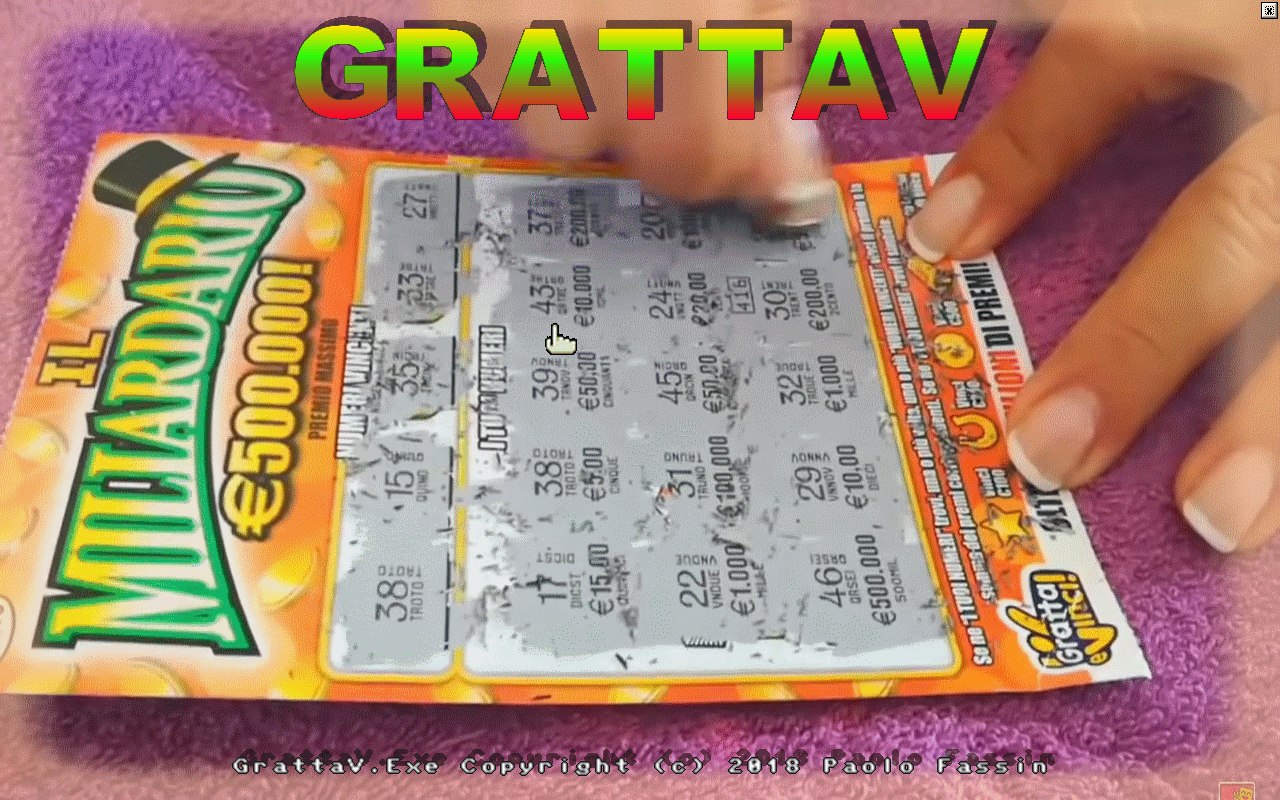
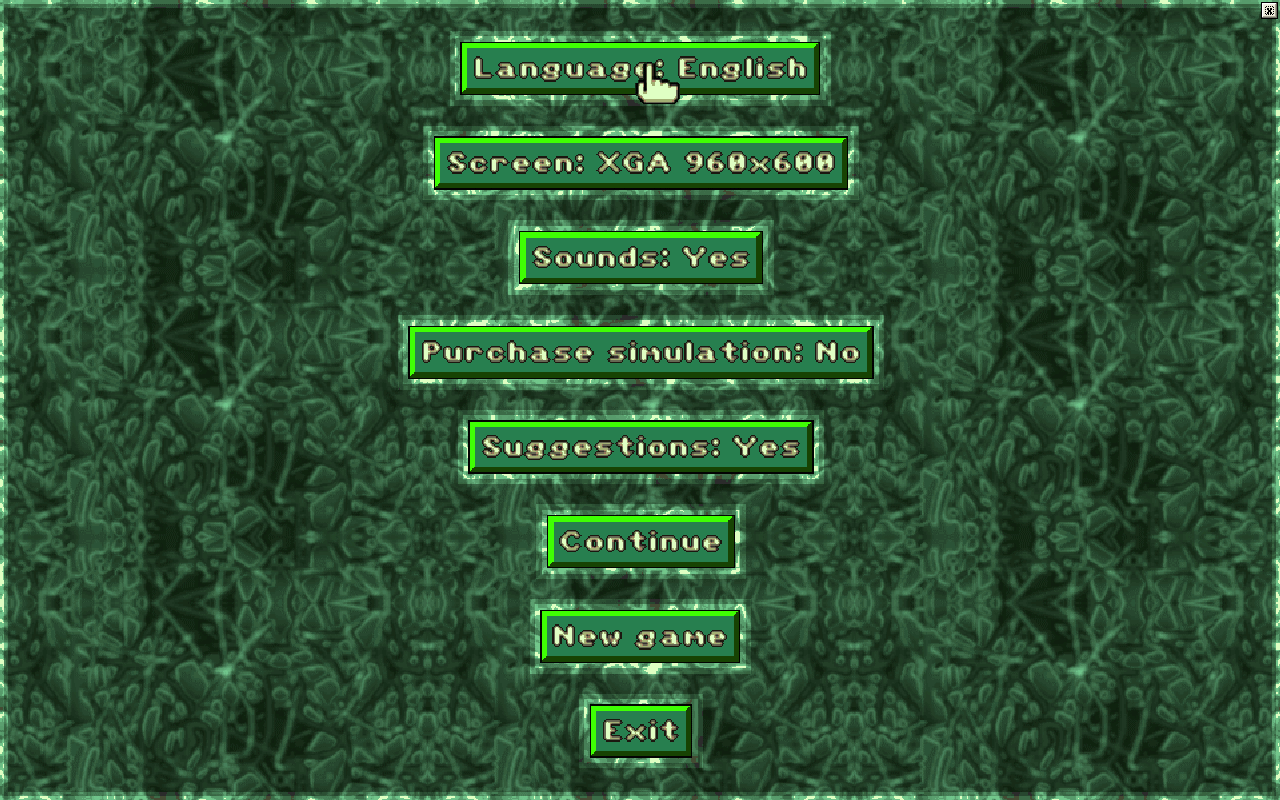
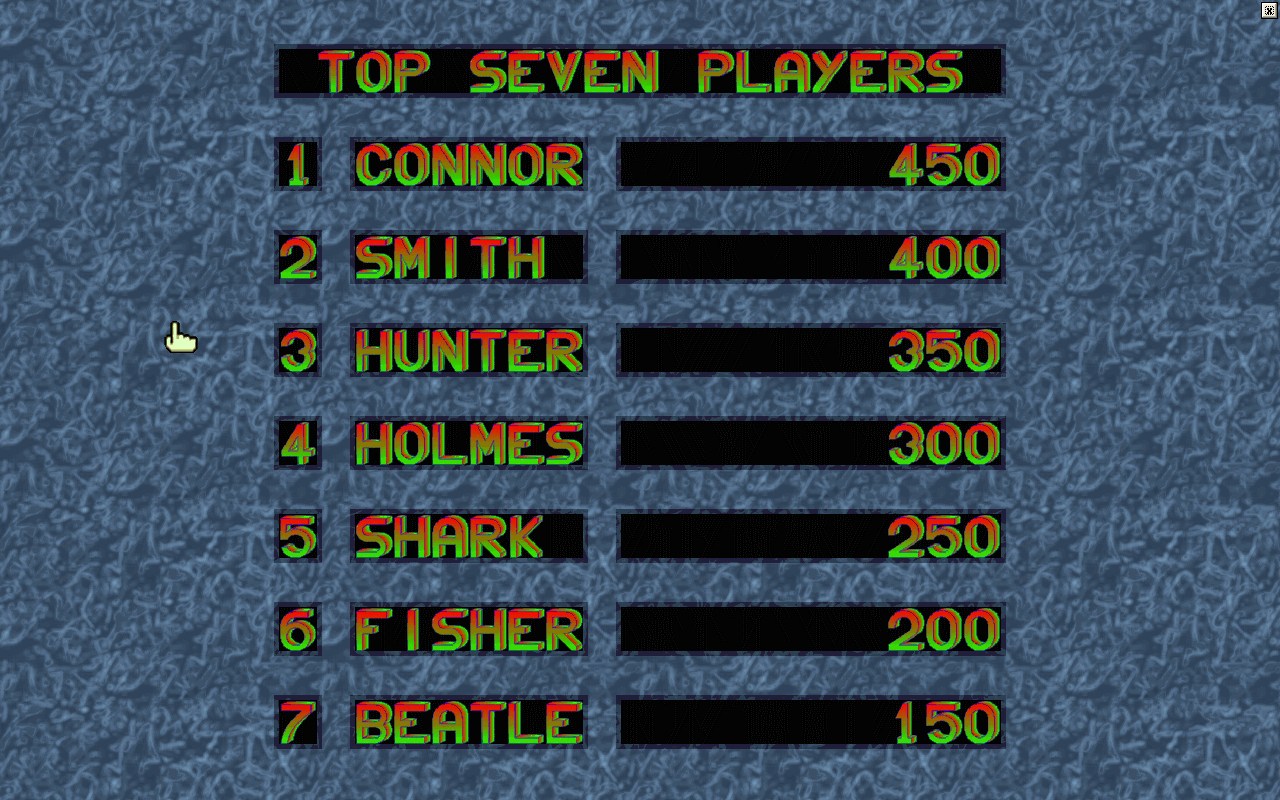
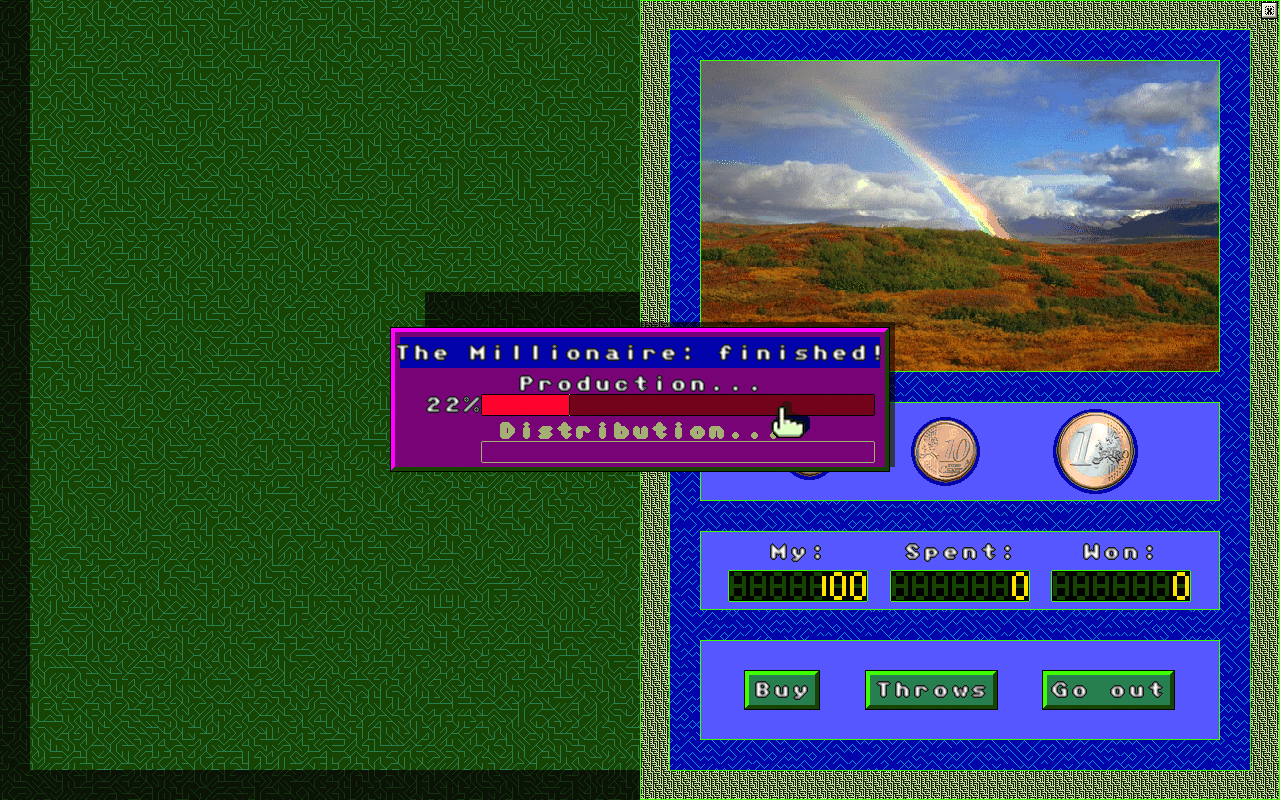
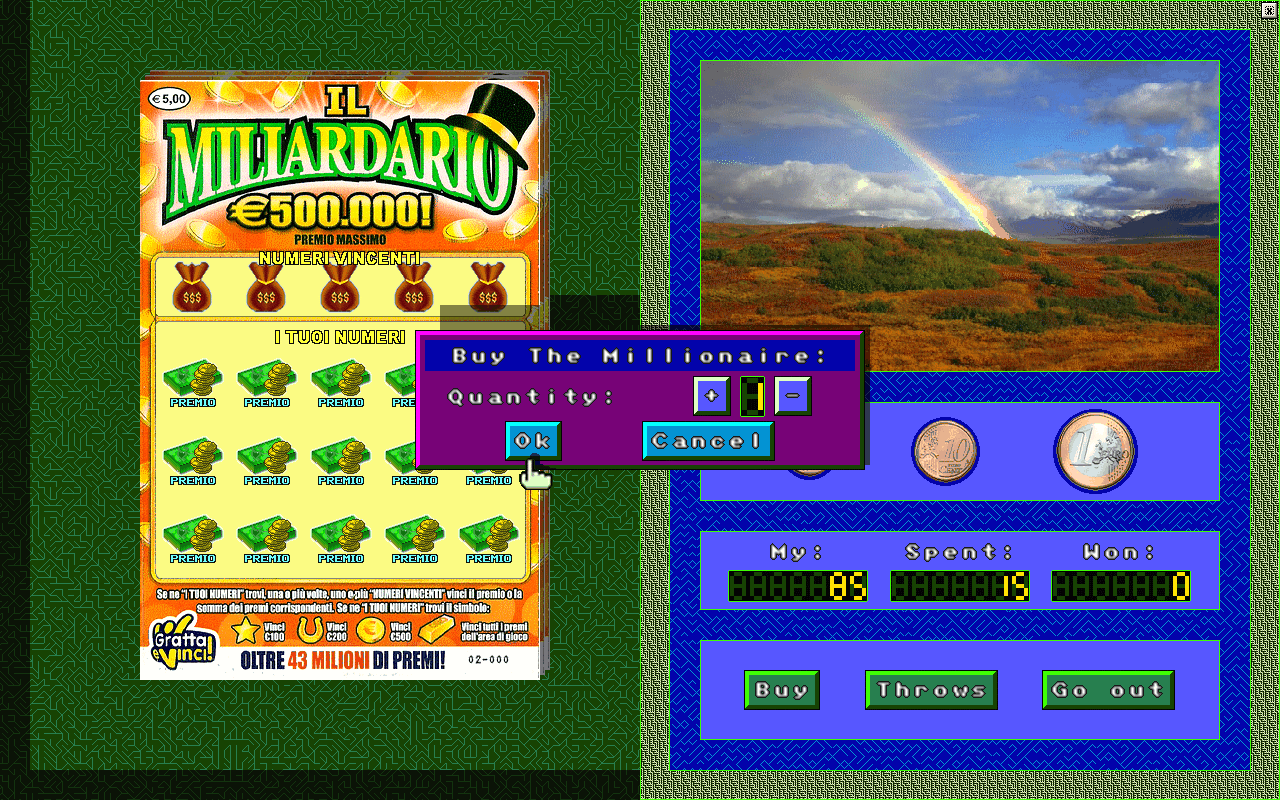
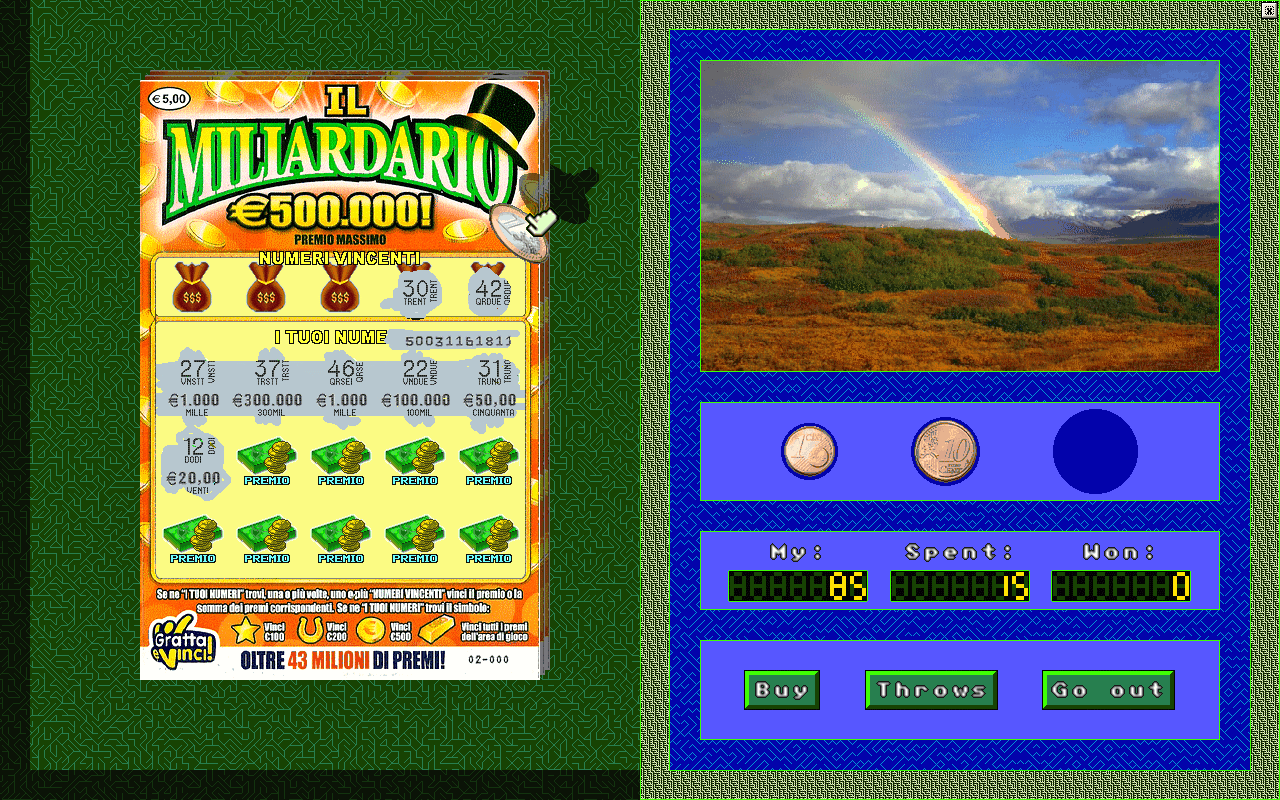

Comments
Log in with itch.io to leave a comment.
is this blind accessible?
My web site and some of may game are acqually subjected to a periodical revision. Due to my hospital recovery of 3 month for an accident I've temoporary suspended this revision.
In case of "accessibility: blind-friendly" I wrong, but in the future is likely that I implement this features.
Anyway with two friend, one not blindy, this feature is partially avalaible.